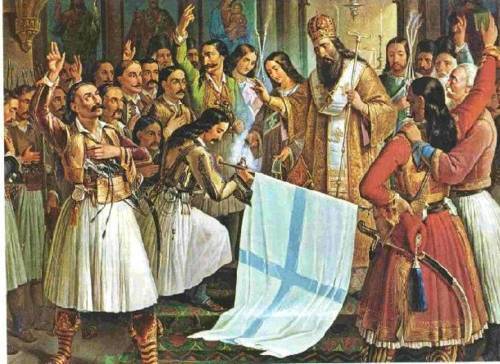|
********************************************************************
The
Greek Revolution of 1821 that led to an eight-year war for independence was a
movement with complex origins and causes.
The Christian populations that revolted against the Ottoman regime were neither
homogeneous nor of uniform interests and attitudes.
A
combination of factors contributed to the outbreak of the Greek War of
Independence in the spring of 1821.
Origins of the Greek War
of Independence
·
Deterioration of the Ottoman imperial structure that led to
corruption and increased taxation and rise of the local Muslim notables that
challenged the central government.
·
Changes in the land holding system and consequent
hardship of the peasant populations.
·
Greek
economic revival of the 18th century brought about by the British-French wars,
the provisions of the Russo-Turkish treaties of 1774 and 1792, the French
Revolution and the French-British wars that followed.
·
Extraordinary
increase of the Greek merchant marine, remarkable prosperity
of Greek merchants and a rapid expansion of Greek handicraft industries.
·
Rise of new
middle class both within the Ottoman Empire and in merchant communities
abroad.
·
Nationalist propaganda of
small, literate elite.
These factors
unleashed new political forces and brought about a new intellectual climate.
Outbreak of the Greek Revolution
The
outbreak of the Greek Revolution of 1821 was not a highly coordinated event
that saw the unanimous uprising of the subject Christian or Greek populations.
It was
a product of the deep changes referred to above as it was the result of
circumstances of the moment.
Taking advantage of the Ottoman campaign to
crush Ali Pasha, a powerful disobedient provincial governor, two Greek
uprisings took place in 1821.


Ø The
first and less successful one was led by leader of the Filiki Etairia, Alexander Ypsilantis and took place in
the Danubian lands but was ruthlessly crushed by
the Ottoman army.
Ø The
second occurred in March 1821 in the south Peloponnese. The Peloponnesian uprising by mostly
Greek-speaking peasantry sparked the
start of the Greek Revolution.
These developments
meant that:
·
the wealthy Greek merchants and ship owners and Greek local
government officials who had a lot to lose from the collapse of the Ottoman
regime were forced to throw their weight behind the Greek War of Independence;
·
the illiterate Christian Orthodox peasantry, who cared little
about the teachings of Greek nationalist intellectuals but were weighed down by
taxation and deprivation, came to form the army of insurgents.
The
Peloponnesian uprising was followed by a number of uncoordinated campaigns,
many successful and some followed by large-scale massacres. However, the deep cleavages within Greek society meant
that the significant early successes of the insurgents were withered away.
Regional, ideological and class differences between the different sections of
the Greek or Christian Orthodox populations meant that the Greek Revolution was
a movement seriously weakened by internal conflict.
Ø By
1826, the Greek War of Independence seemed to have come to an end with the
Ottoman forces winning on all fronts. Had not Europe come to the rescue the
Greek Revolution of 1821 would have come to nothing.
- In
1832, The Treaty of Constantinople recognized Greece as an independent
nation.

